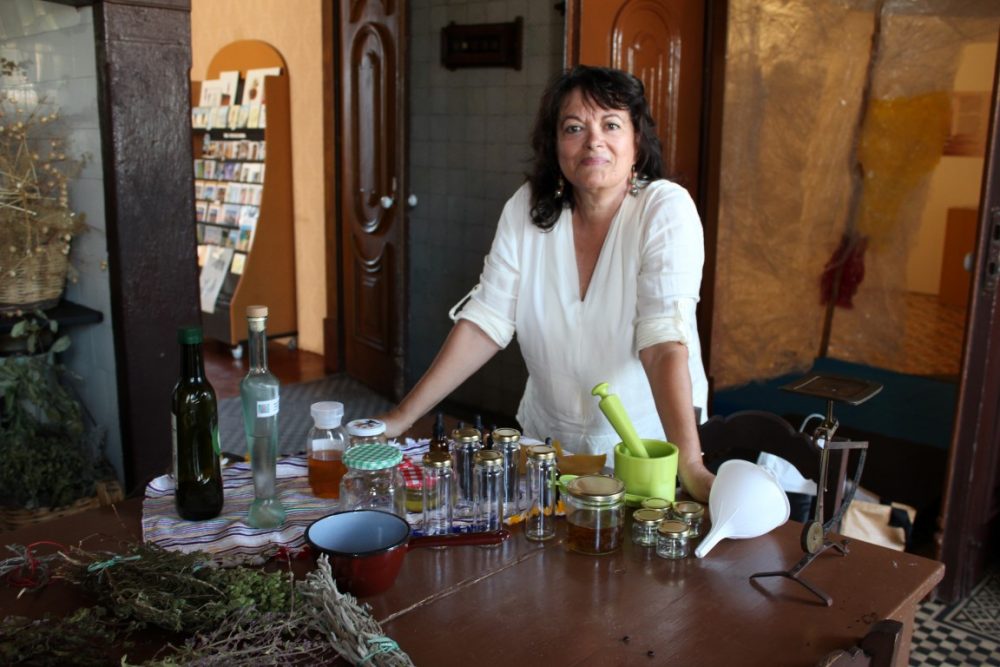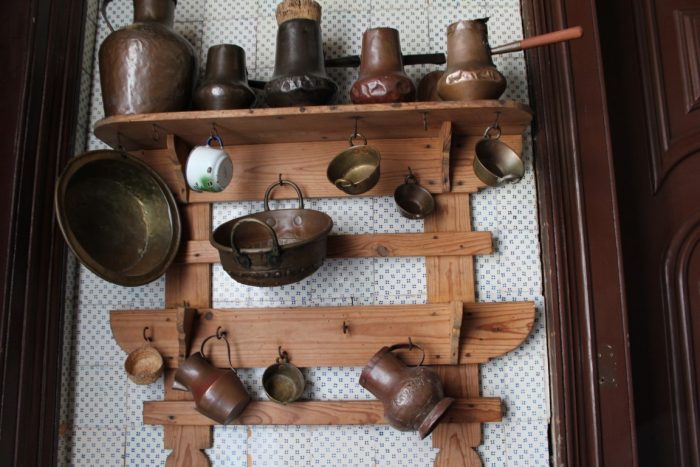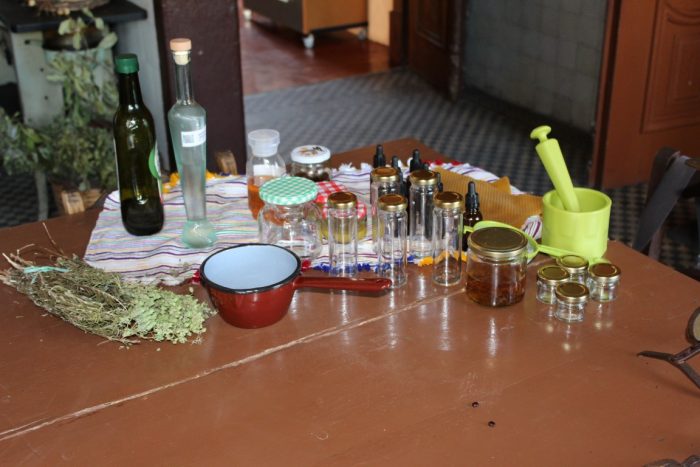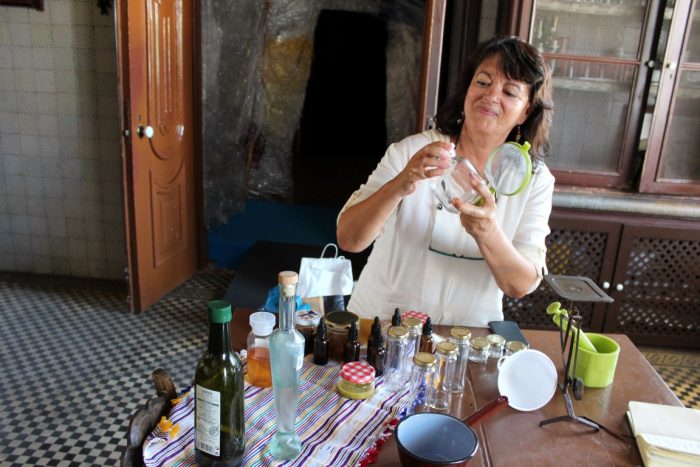
Otília Eusébio is 62 years old and has a life marked by the love of nature. She has a degree in Pharmacy and for decades she worked in a laboratory. When he retired, he decided to leave Lisbon and return to his Algarve, where he was born. Now he is divided between two passions, which he tries to combine: pharmacy and gastronomy. “That's how I am happy”, he confesses.
Always with a smile on your face, Otilia Eusebio it takes, one by one, all the ingredients it needs for its . There are oregano, honey, olive oil, arbutus… and bighead thyme. “A unique species, which is only found in the Eastern Algarve”, he readily explains. The scenario could not be more coincident: it is on the kitchen table of the Museu do Trajo, in São Brás de Alportel, that Otília Eusébio is placing all these products. In front of you, there are pots and pans that remind you of ancient times.
Not old – and even quite recent – is Otília's project “The kitchen is a pharmacy”, which was born in February this year and which two weeks ago obtained registration as a trademark at the INPI, the National Institute of Industrial Property.
Currently, only through workshops, “in the future, who knows where”, Otília tries to bring together in this project everything that is “very dear to her”: pharmacy, gastronomy and the “educational aspect of all this”. The objective of this Loulé woman is to «teach how to eat» and «defence the natural products of our area, bought from producers who have an ecological and organic food concept». Why? “Because this is the one that is really good for our health,” he explains.
In the dishes that you make - and that teaches you how to make workshops -, Otília, who is not a vegetarian, brings together everything she knows about natural and nutritional benefits, for health, food, with taste and flavour. This is the so-called “educational aspect” you speak of.
But this Algarve's interest in food is not exhausted here. Otília belongs to the international movement Slow food."I believe that food can be involved in a change in the economy and in politics," he explains. This is also the philosophy of the movement Slow Food, which, in the Algarve, may have an example: the medronho, which «has enormous potential in terms of local development», he says.
For now: “healthy gluttony”. Later: “food tourism”
All of Otília Eusébio's work is based, for now, on the workshops that goes on, many of them members of the “Loulé Criativo” program. In addition to training for adults, there is also a place for youngsters to learn how to eat. These, confesses Otília, "have been very popular."
“Kids like candy because it gives pleasure”, he says. in these workshops, whose name is “Gula Healthy”, Otília has the youngsters cooking and reinventing sweets, such as Nutella. «With pure cocoa and hazelnuts, it is possible to make a healthy and very tasty Nutella. All kids join and like it», he says.
With these practical workshops, this Loulé has the objective of «educating, from an early age, the youngest» so that they transmit the lessons to their parents. «The truth is that they point out the recipes, go home and reproduce what we do in the workshops», confesses, proud.
In addition to these formations, Otília has a great idea in mind: «to take the landscape to the pot». That is, «making gastronomic and cultural weekends», always related to nature. With this initiative, Otília wants to “take pots and pans out into the street and enjoy the landscape”, in other words: cooking, teaching the natural benefits of each food, and at the same time enjoying the natural wonders of the Serra Algarvia.
The “mezinhas” of the XNUMXst century
For decades, Otília Eusébio lived far from nature and surrounded by test tubes, tweezers and spatulas in the laboratory. The taste for nature and the “natural dimension” of the pharmacy, even so, never died. It is, in fact, genetic: «my great-grandmother, whom I never met, was a plant gatherer. As a child, I heard many of her natural recipes through my grandmother's mouth», she says, with a smile on her face.
Today, adding this to the knowledge of the Pharmacy course, in addition to the project “The kitchen is a pharmacy”, Otília will launch a line of natural cosmetics online, “with products from Serra de Monchique, Serra do Caldeirão and Ria Formosa”, he explains.
In this line it will be possible to find various ointments, tinctures and even sunscreens. "People usually think that artificial products are only consumed through the mouth, but the truth is that they can also be consumed through the skin, which is even our largest organ", he says, with a bottle of oregano ointment in his hand.
Although her project focuses only on natural products, Otília recognizes that there are “great medicines that we have to take”, but she does not fail to warn that it is “need to rethink the use of additives, because of so much product that makes us sick, that comes with an active principle, but which brings a whole range of harmful products».
The Mediterranean diet is «the best in the world»
Otília Eusébio's entire life is guided by the motto of healthy eating. In addition to the projects he has, he is also president of Association of Lands and Peoples of the Mediterranean Diet, or if the latter were not “the best in the world”, as he guarantees.
“The Mediterranean diet is not only made with indigenous products [products originating in a region]. If so, we would only eat chestnuts, carob or acorns. The Mediterranean diet was an entire culture from abroad that came to us during the Discoveries period», warns Otília. And he adds: «Everything created here is also a Mediterranean diet, such as mangoes, avocados or pitanga. With the Mediterranean diet, it is possible to have an incredible variety of dishes».
For Otília, this is really the basis of a healthy diet: variety and «having everything in the proper proportions», without ever forgetting that «we have the best fish in the world».
The truth is that, strangely enough, this “in love with nature” lives in the city. “My dream was to find a house in the countryside, but as I have a house in Loulé, I live there”, he confesses. At a time when the return to the field is very much in vogue, Otília does not see it as the only possibility to follow this idea.
Always calm, with a smile on her face, as she puts away all the products she knows like no one else, she leaves a warning: «Even without having a vegetable garden and living in the city, it is possible to return to the land, if we are conscientious consumers. When you buy products from an environmentally conscious producer, you are already back down to earth».
Photos: Pedro Lemos|Sul Informação





















Comments